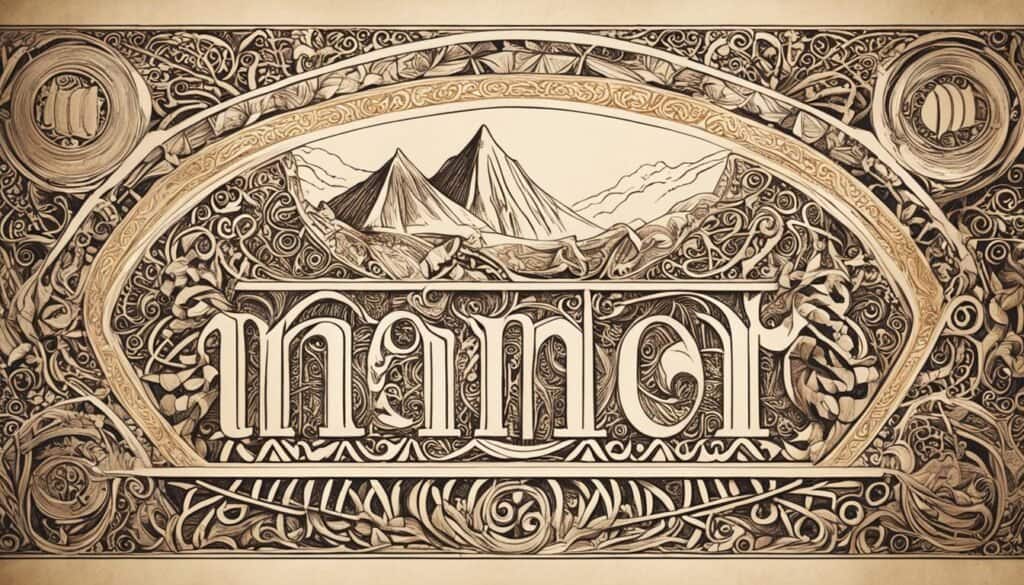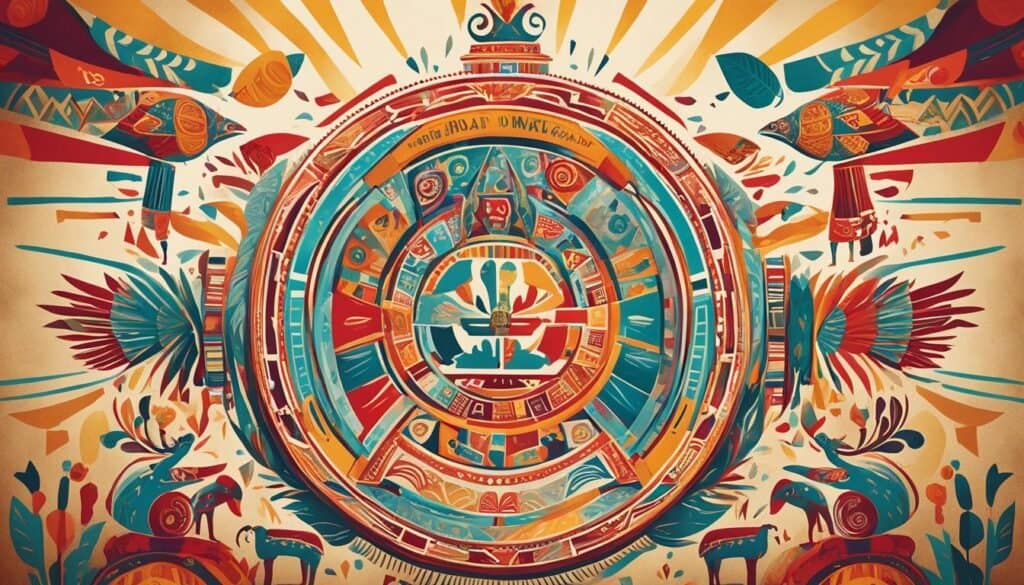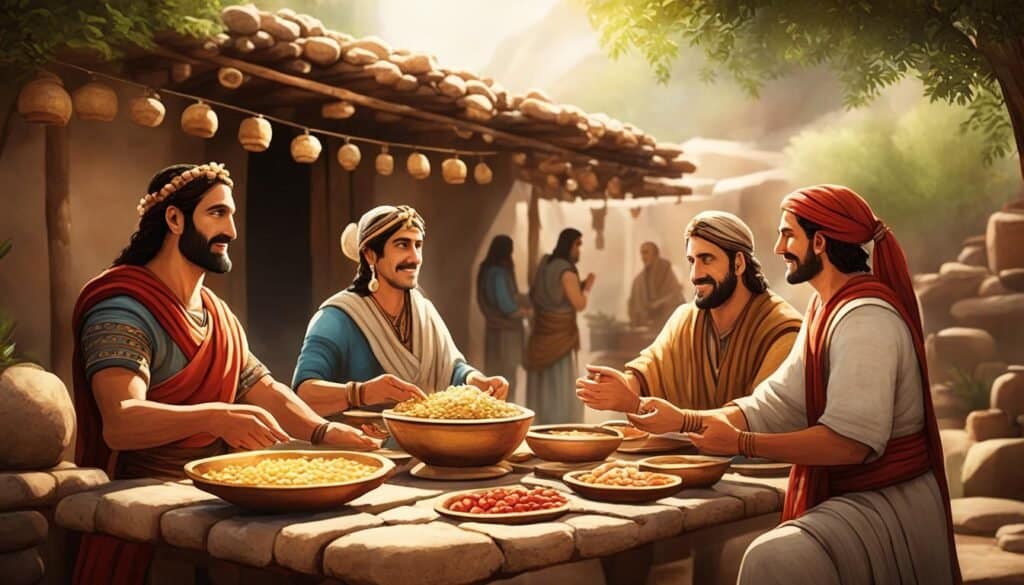Welcome to a journey back in time. We’ll explore the hidden gems of ancient people and their ways found in Genesis. From the start of time to family relationships and God’s interactions with us, Genesis shows a world filled with traditions and divine moments.
Have you thought about how the Earth was made and why things happened in a certain order? Ever wondered about the meaning behind important names in the stories? Or what about the role of covenants and how they shaped both people and communities?
We’ll look into these ideas and more in this article. Get ready to see ten amazing insights into what life was like for our ancient ancestors because Genesis is filled with interesting facts about their customs and beliefs.
Key Takeaways:
- Genesis offers valuable insights into the ancient cultures and customs of the past.
- The order of creation days reflects the ancient Near Eastern views on cosmic order and divine sovereignty.
- Names in Genesis often hold prophetic or descriptive significance, revealing character traits or destinies.
- Covenants in Genesis serve as formal agreements with moral and social implications.
- Family and tribal loyalties play a significant role, establishing social status and obligations.
Creation and Cosmic Order
Genesis 1 tells us about the incredible creation of our world. It was done in seven days, showing a structured pattern. This reflects old beliefs about divine power and order in the universe.
Each day in this creation story brings something new to life. We see light and dark separate, then the sun, moon, and stars appear. The world is made in a beautiful, organized way.
The order in Genesis 1 highlights the importance of balance and purpose. This way of telling the creation story shows how detailed and thoughtful it was. It also shows us that God has a plan for everything.
In those ancient times, people thought that gods created the world with a clear plan. Genesis uses a similar idea to describe how God made everything. It fits with this idea that creation was a carefully crafted masterpiece.
The creation story also makes it clear that God is in control of everything. He decides where land and sea start, grows plants and animals, and creates humans. It shows His total leadership over the world.
Looking at old beliefs about the cosmos, Genesis gives us a deep look into God’s connection with our world. The creation story tells us about God’s perfect plan and design for everything. It teaches us about His complete control and care for his creation.
The World in Seven Days
Genesis describes the creation as happening in seven steps. Each day, a new part of the world is made. On the final day, God makes people. This shows God’s ultimate authority and control over Earth.
It begins with light and dark being divided. It ends with God making humans in his image. This unique series of steps shows God’s thoughtful design and plan. It also shows his power over everything that exists.
The universe was carefully woven together piece by piece. Every item was made to fit perfectly into God’s grand design. This creation wasn’t random; it was planned every step of the way, showing God’s complete rule over everything.
“And God said, ‘Let there be light,’ and there was light. […] And there was evening, and there was morning—the first day.”
(Genesis 1:3, 5)
This Bible passage shows how each day clearly starts and ends. This detailed way of describing creation shows a thoughtful process. It reflects the belief in a carefully organized world.
In the end, Genesis 1 gives us a powerful look at the world’s creation. It agrees with ancient thoughts about order and divine power. The story’s detailed structure points to God’s clear plan and the importance of his direct involvement.
The Significance of Names
In the book of Genesis, names have a deep meaning. They often tell the traits and futures of those named. The names in Genesis show us the beliefs and values of the people back then.
For instance, Adam means “man” or “from the earth” in Hebrew. It shows he was the first human, made by God from earth’s dust. Adam’s name points to his link with the physical world and his as role as the first man.
Another name is Eve, which stands for “living” or “life-giver.” This name shows she was the first woman and mother of all. It underlines her importance in bringing forth life and as a mother of future generations.
These examples are just the start. In Genesis, all names are picked to mirror the essence and aim of those named. This gives us insight into the characters’ nature, purpose, and their time’s culture.
The Prophetic Meaning of Names
Names in Genesis go beyond just titles. Often, they predict what someone will do or be. An example is Isaac, meaning “laughter.” This name points to the joy his birth brought to his parents when they were very old.
Then there’s Jacob, which means “heel holder” or “supplanter.” It hints at him taking his brother’s place and the life struggles he will face. Jacob’s name shows his crafty side and his future actions.
Understanding these names adds depth to the characters and their stories. It shows the divine plan and involvement in the lives of those in Genesis. This shows how closely the human and divine are connected in the book.
| Name | Meaning | Significance |
|---|---|---|
| Adam | “Man” or “from the earth” | Symbolizes human origin and connection to the physical world |
| Eve | “Living” or “life-giver” | Emphasizes her role as the first woman and mother of all living beings |
| Isaac | “Laughter” | Reflects the joy and laughter his birth brought to his parents, Abraham and Sarah |
| Jacob | “Heel holder” or “supplanter” | Foretells his role in supplanting his older brother Esau and the challenges he will face |
Names in Genesis deepen the story. They offer clues to the character’s traits, divine roles, and culture. Knowing the names’ meanings helps us appreciate the narrative and the link between human and divine in Genesis.

The Role of Covenants
In Genesis, covenants are key, acting as special pacts between God and people. They’re more than contracts, mixing law with a sacred connection. This bond shapes not just history but also the fates of those involved.
One of these is God’s promise to Noah after the flood in Genesis 9. He promises no more colossal floods. And he sets the rainbow in the sky as a sign of this covenant.
“I have set my bow in the cloud, and it shall be a sign of the covenant between me and the earth.”
(Genesis 9:13)
So, the rainbow marks both an oath and a visible memory. It reminds us of God’s loyalty, stressing the moral lessons of the deal.
Abraham receives another crucial agreement in Genesis 17. This time, it’s about making his descendants a strong nation. As a seal, God asks that males be circumcised after eight days.
“This is my covenant, which you shall keep, between me and you and your offspring after you: Every male among you shall be circumcised.”
(Genesis 17:10)
Circumcision is more than a custom. It’s a mark of faith, heritage, and shared promises, linking people closer to God.
In Genesis, these covenants are powerful. They’re about God’s gifts, assurances, and what he expects in return. Through them, God builds a strong link with us, guiding our ethics and communities.
Studying Genesis opens eyes to its rich stories of cooperation with God. These contracts are real guides, aiding both personal growth and group ethics. And physical signs make sure we remember our commitments well.
Family and Tribal Loyalties
In Genesis, we see how important family and tribal loyalties are. They affect where we stand in society and our duties. The tale of Jacob and Esau underlines these intense family dynamics. It shows that in ancient times, your family could decide your whole life.
Jacob and Esau’s rivalry is key here. Jacob, the younger twin, changed his family’s fate by seeking his father’s blessing. Even though it meant tricking his father and outwitting his brother, Jacob’s actions teach us about the deep ties and struggles within families.
Also, getting the family’s blessing is a big deal in Genesis. It shapes individual and group fates profoundly. In ancient times, this blessing was like a prophecy that decided life’s directions.
Genesis stories aren’t just about families. They’re about tribal power and family roles too. These stories are valuable because they show us how family life, rights, and fates were entwined. People’s positions and destinies were heavily influenced by their family’s history.

| Key Aspects | Implications |
|---|---|
| Lineage | Determines social status and obligations. |
| Inheritance | Power dynamics within the family unit. |
| Blessings | Signify the shaping of destinies. |
Hospitality Customs
Hospitality is a big deal in Genesis. The act of welcoming guests and sharing what you have was very important. It showed the value of helping and keeping people safe. For instance, Abraham welcomed three visitors in Genesis 18.
Abraham and Sarah took good care of the visitors. They offered them food, water, and a place to rest. This kind act shows their culture’s focus on helping people who were not from their town. It shows the benefit of being open-hearted and helping strangers.
“Let a little water be brought, and wash your feet, and rest yourselves under the tree, while I bring a morsel of bread, that you may refresh yourselves, and after that you may pass on—since you have come to your servant.” (Genesis 18:4-5)
Helping visitors was more than just meeting their needs. It was making sure they were safe. In those times, travelers relied on others for a place to stay and food. They faced a lot of dangers on their trips.
Welcoming these travelers meant a lot. It showed a commitment to help and protect each other. It made their community stronger and safer. By offering kindness, people like Abraham made the world better for everyone.
Hospitality was like a glue that held communities together. It created trust and brought people closer. This tradition was all about understanding that helping others helped everyone. It taught the importance of unity and caring for those around us.
Welcoming Visitors: A Universal Value
The idea of being kind to strangers goes way beyond Genesis. Many cultures and societies know the importance of being welcoming. It’s a simple way of showing we care about others.
Welcoming people can make our lives better. It leads to new connections and stronger relationships. By sharing what we have, we show that we all want to feel loved and accepted.
So, extending hospitality is a timeless tradition. It goes back to ancient times. The story of Abraham welcoming guests shows how important it is to care for others. It teaches us to be kind and create a sense of belonging for all.

Marriage and Betrothal Practices
Genesis shows us marriage and betrothal customs of ancient days. These stories teach us about commitment, dealing with others, and how marriages were for the whole community.
Isaac and Rebekah’s tale is a good example. Abraham’s servant had to find Isaac a wife. He did this by negotiating with Rebekah’s family, bringing gifts to show Isaac’s serious intentions.
“Rebekah came out, a beautiful virgin, and gave water to the servant. She even offered to water his camels. This shows us how deeply community and family were involved in marriage decisions.”
Genesis 24:15-19 (KJV)
These ancient talks about marriage show it wasn’t just about the people in love. The whole community and both families were a big part of it. Everyone had a say in joining these two lives together.
Learning about these practices in Genesis is valuable. It shows us how important it was for everyone to be part of getting two people married.
| Marriage and Betrothal Practices in Genesis | Key Aspects |
|---|---|
| Betrothal | Contractual negotiations involving families |
| Dowries | Gifts given by the groom’s family to the bride’s family as a sign of commitment |
| Community Involvement | Recognition that marriage is a communal union, involving families and wider social circles |

The story of Isaac and Rebekah shows how marriages were once done. It teaches the value of negotiation, exchanging gifts, and how everyone played a role in getting two people married. We learn a lot about ancient customs and the significance of everyone joining in to make a marriage happen.
Birthright and Inheritance
In the book of Genesis, birthright and inheritance are very important. They refer to the rights of the firstborn, including getting a double share of the family’s property. This idea was key in olden days and mattered a lot legally and in families.
Jacob and Esau’s tale in Genesis is a great example. Esau should have inherited more because he was born first. But Jacob tricked him out of his birthright, gaining more than his fair share of wealth and attention.
This story shows how being born first could grant you extra influence and riches. It also highlights how people might use tricks or deceit to get ahead, even within their own families.
“And Jacob said, ‘Sell me your birthright now.’ Esau said, ‘I am about to die; of what use is a birthright to me?’ Jacob said, ‘Swear to me now.’ So, he swore to him and sold his birthright to Jacob.” (Genesis 25:31-33)
The Jacob and Esau story brings up the value of being the eldest. It shows how far someone might go to claim the status and benefits of the firstborn.
Looking at Genesis’s birthright traditions helps us see how ancient communities worked. It shows their rules and the effects of those rules on family life.
To really understand birthright and inheritance, we should look deeper at how old cultures viewed the firstborn. This can give us a better picture of the issues discussed in these biblical stories.
Divine Interaction
In the book of Genesis, God interacts with people in a way that’s different from other ancient stories. Most gods were far away and never talked to or helped people. But the God of Genesis is different. He directly guides, protects, and even wrestles with people. This shows a close bond between God and humanity in Hebrew beliefs.
One story in Genesis stands out. It’s when God wrestles with Jacob. In Genesis 32:24-30, Jacob fights a man all night. Later, Jacob learns this man was actually God. This story highlights the personal and close relationship between God and humans in Hebrew thought.
And Jacob was left alone. And a man wrestled with him until the breaking of the day. When the man saw that he did not prevail against Jacob, he touched his hip socket, and Jacob’s hip was put out of joint as he wrestled with him…
The wrestling match between Jacob and God is significant. It shows how deeply God is involved in the lives of his chosen ones. He not only guides and protects. He’s also ready for personal, life-changing encounters.
In Genesis, God interacts with people in various ways. For instance, God directs Noah to build an ark. He speaks with Abraham too. These connections underscore a key Hebrew belief. They show a God who is very active in human affairs, guiding and shaping history.
Divine Engagement in Hebrew Theology
Understanding God’s unique interaction is key to Hebrew beliefs. It shows the central role God plays in the lives of the Israelites. Their faith and trust in God are crucial.
In Hebrew thinking, God and his people have a special agreement. This agreement is marked by God’s direct involvement in human lives. It shows that God expects certain things from people. But in return, he promises his guidance, protection, and blessings.
The stories in Genesis offer a personal view into Hebrew theology. They depict a God who speaks to and influences the lives of his people. These interactions are seen as empowering and transformative. They show the depth of the relationship between God and humanity.
The image above symbolizes Jacob’s night-long struggle with God. This event is a powerful illustration of Hebrew theology. It underlines the life-changing effect of God’s direct interaction with people.
Agriculture and Animal Husbandry
In Genesis, we see the diverse jobs people had back then. Notably, there’s a difference between nomadic shepherds like Abel and farmers like Cain. Both these ways of life were crucial in ancient times and are highlighted in Genesis.
Nomadic shepherding was common in the past. It involved guiding livestock, like sheep, to greener pastures. People moved a lot to ensure their animals found enough food and water. This let them adapt quickly to their environment.
Conversely, settled agriculture meant growing crops and living in one place. People would set up their own homes and farms. This way, they could grow food and establish thriving communities. It marked the start of more advanced societies.
Genesis shows these two ways of life as vital. It illustrates how they supported communities and led to different lifestyles. There were also tensions between these groups, as noted in the stories.
These jobs shed light on ancient society’s social and economic aspects. Nomads were closer to nature and relied on each other to survive their journeys. In contrast, farmers built stable communities and specialized in their work.
Studying Genesis’ story offers insights into how ancient cultures survived. It shows us the intricate relationship between people, land, and the way they farmed. Agriculture and animal care were key to their existence.
Judicial Processes and Conflict Resolution
In the book of Genesis, we find many stories about solving conflicts and setting up rules. These stories show how people in ancient times avoided fights and solved problems. They give us clues about mixing God’s wisdom with what’s right and legal.
Abram and Lot’s story is a great example. They decided to split their lands to prevent fights over space for their animals. Abram suggested this split to keep peace. It shows his wisdom and wish for everyone to get along.
“Please, let there be no strife between you and me, and between my herdsmen and your herdsmen; for we are brothers.” (Genesis 13:8)
Abram talked about brotherhood to make peace. This ended the argument and made both sides happy. It was a fair way to solve their problem.
The tale of Jacob and Laban is another good example. Laban chased Jacob to get back his family and things. But God came to Laban in a dream. God told Laban to talk to Jacob in a nice way. This dream helped avoid a big fight and made things calm again.
These stories from Genesis show us how important fairness and peace are. Everyone tried to be fair, with God as their witness. They wanted to keep their agreements honest and good.
Not all stories in Genesis end well. The tale of Cain and Abel warns us about what happens when people don’t solve their problems. It shows how bad things can get without peace.
Looking at these old stories helps us see the ancient times. They show us how important God’s wisdom and help are in solving problems. These stories remind us to always aim for fairness, justice, and peace in our lives.
Key Takeaways
- Genesis gives us a peek into law and peace in old times.
- Stories like Abram and Lot teach us to solve fights quickly and keep peace.
- God’s help and fairness matter a lot in legal matters.
- The Cain and Abel story warns us of what can go wrong without peace.
| Genesis Story | Key Insights |
|---|---|
| Abram and Lot | Importance of peaceful resolution and unity within the community |
| Jacob and Laban | Divine intervention as a deescalation strategy and peaceful resolution of conflicts |
| Cain and Abel | Cautionary tale highlighting the destructive outcomes of unresolved conflicts |
Conclusion
In conclusion, our look into the book of Genesis has been eye-opening. It has shown us how ancient cultures and their ways have shaped our world. We have seen stories of divine interaction influencing the lives of many.
Genesis tells tales from the creation in seven days to complex family and tribal relations. It shares the importance of names, the meaning of covenants, and the strong ties of family and tribe. We’ve also looked into how hospitality, marriages, and solving conflicts were done.
This journey through Genesis has been enriching. It has shown the deep impact of ancient cultures on our history and faith. These ancient texts provide insights into traditions’ beginnings, the structures of society, and the lasting influence of faith.
Affiliate Disclosure: "As an Amazon Associate I earn from qualifying purchases made from links in this post. We are a participant in the Amazon Services LLC Associates Program, an affiliate advertising program designed to provide a means for us to earn fees by linking to Amazon.com."

